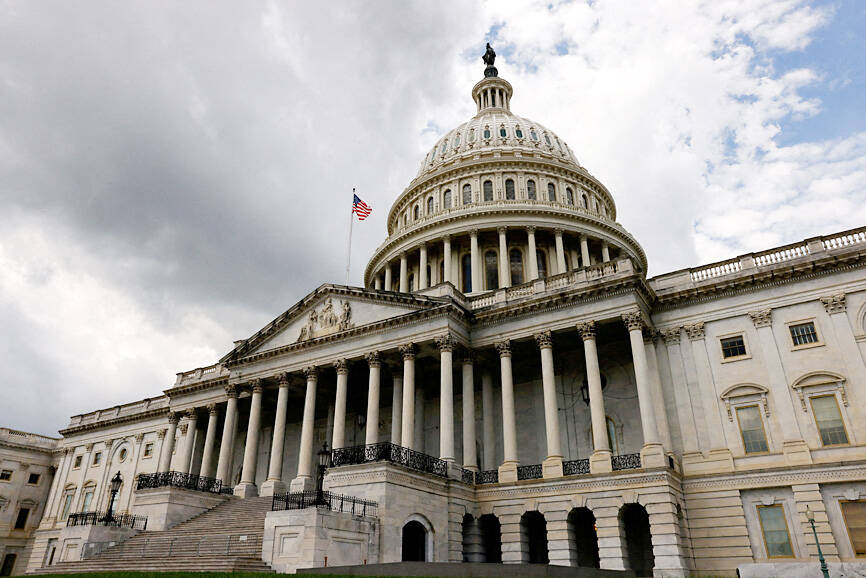The US Congress on Wednesday voiced bipartisan support for legislation to avoid double taxation between Taiwan and the US.
US senators Ben Cardin and Jim Risch, chair and ranking member of the Senate Foreign Relations Committee respectively, along with Ron Wyden and Mike Crapo, chair and ranking member of the Senate Finance Committee respectively, endorsed a package of legislation to provide double-tax relief between the two nations ahead of its scheduled markup in the US House of Representatives’ Ways and Means Committee yesterday, the foreign relations and finance committees said.
The legislation released by the Ways and Means Committee incorporates the US-Taiwan Expedited Double-Tax Relief Act and the US-Taiwan Tax Agreement Authorization Act, they said.

Photo: Reuters
The US-Taiwan Expedited Double-Tax Relief Act passed unanimously out of the Senate Finance Committee in September and was formally introduced in the Senate and the House last month.
The Taiwan Tax Agreement Act passed out of the US Senate Foreign Relations Committee by voice vote in July, authorizing US President Joe Biden’s administration to negotiate and conclude a tax agreement between the two sides.
The four leaders of the Senate committees on Wednesday said in a statement that “providing double-tax relief is “a long overdue step” to bolster the important relationship with Taiwan, which is “one of the world’s largest economies” and one of the US’ top trading partners.
The bills would address the problem of double taxation, facilitate broader investment between the two sides, create more jobs across the US and “help promote our collective prosperity, national security and economic resilience,” they said.
The legislation provides expedited double-tax relief through amending the US tax code, which “paves the way for future agreements” between Taiwan and the US on additional and more comprehensive double-tax relief, they said.
The leaders “fully endorse this legislative effort” and applaud the Ways and Means Committee for its planned markup of the bills, they said.
“We look forward to the swift passage of this legislative package and enactment into law as a critical step forward in our continued partnership with Taiwan,” they added.
In Taipei, the Ministry of Foreign Affairs yesterday welcomed the bills, saying that the government would continue to work closely with the US government and US Congress to foster complementary and mutually beneficial economic, trade and investment relations between Taiwan and the US.

The US government has signed defense cooperation agreements with Japan and the Philippines to boost the deterrence capabilities of countries in the first island chain, a report by the National Security Bureau (NSB) showed. The main countries on the first island chain include the two nations and Taiwan. The bureau is to present the report at a meeting of the legislature’s Foreign Affairs and National Defense Committee tomorrow. The US military has deployed Typhon missile systems to Japan’s Yamaguchi Prefecture and Zambales province in the Philippines during their joint military exercises. It has also installed NMESIS anti-ship systems in Japan’s Okinawa

‘WIN-WIN’: The Philippines, and central and eastern European countries are important potential drone cooperation partners, Minister of Foreign Affairs Lin Chia-lung said Minister of Foreign Affairs Lin Chia-lung (林佳龍) in an interview published yesterday confirmed that there are joint ventures between Taiwan and Poland in the drone industry. Lin made the remark in an exclusive interview with the Chinese-language Liberty Times (the Taipei Times’ sister paper). The government-backed Taiwan Excellence Drone International Business Opportunities Alliance and the Polish Chamber of Unmanned Systems on Wednesday last week signed a memorandum of understanding in Poland to develop a “non-China” supply chain for drones and work together on key technologies. Asked if Taiwan prioritized Poland among central and eastern European countries in drone collaboration, Lin

Renewed border fighting between Thailand and Cambodia showed no signs of abating yesterday, leaving hundreds of thousands of displaced people in both countries living in strained conditions as more flooded into temporary shelters. Reporters on the Thai side of the border heard sounds of outgoing, indirect fire yesterday. About 400,000 people have been evacuated from affected areas in Thailand and about 700 schools closed while fighting was ongoing in four border provinces, said Thai Rear Admiral Surasant Kongsiri, a spokesman for the military. Cambodia evacuated more than 127,000 villagers and closed hundreds of schools, the Thai Ministry of Defense said. Thailand’s military announced that

CABINET APPROVAL: People seeking assisted reproduction must be assessed to determine whether they would be adequate parents, the planned changes say Proposed amendments to the Assisted Reproduction Act (人工生殖法) advanced yesterday by the Executive Yuan would grant married lesbian couples and single women access to legal assisted reproductive services. The proposed revisions are “based on the fundamental principle of respecting women’s reproductive autonomy,” Cabinet spokesperson Michelle Lee (李慧芝) quoted Vice Premier Cheng Li-chiun (鄭麗君), who presided over a Cabinet meeting earlier yesterday, as saying at the briefing. The draft amendment would be submitted to the legislature for review. The Ministry of Health and Welfare, which proposed the amendments, said that experts on children’s rights, gender equality, law and medicine attended cross-disciplinary meetings, adding that